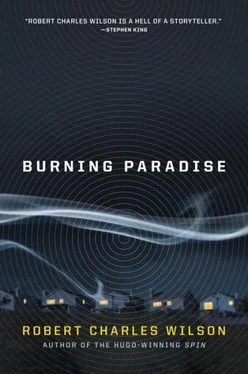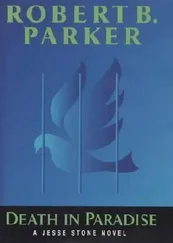But the man seemed to hesitate again. Would a killer hesitate? Of course, she had no real reason to believe he was a murderer or a simulacrum. There had been no violence since the flurry of killings seven years ago. Probably the man was just a drunk disappointed by a luckless night at the bars, or maybe an insomniac with a mind as restless as her own. His interest in the building where she lived might be only an optical illusion; he could have been staring at his own sad reflection in the window of Pike Brothers Furniture Restoration and Sales.
He took another step into the street just as a car turned the corner from Pippin onto Liberty. The car was a dark-colored sedan, blue or black, she couldn’t tell which under the uncertain light of the streetlamps. The driver gunned the engine crazily and the car fishtailed as it took the corner. Cassie supposed the driver must be drunk.
But the solitary stranger didn’t seem to notice. He began to stride across the street as if he had suddenly made up his mind, while the car sped on heedlessly. Cassie looked from the vehicle to the pedestrian, calculating the obvious trajectory but not quite believing it. Surely the car would swerve at the last minute? Or the stranger would turn and leap out of the way?
But neither of these things happened.
The Armistice Day banner flapped twice in the November wind. Cassie pressed her forehead against the chill glass of the window. Her hands gripped the fly-littered sill, and she watched with sick anticipation as the collision evolved from possibility to inevitability to sickening fact.
The car’s fender took the pedestrian at knee level. He dropped and rolled under the grille as if he had been inhaled by it. For one awful moment he simply vanished. All Cassie could see—resisting an almost overpowering urge to close her eyes—was the double bounce of the car’s suspension as its wheels passed over him. She heard the shrilling of the brakes. The car swerved sidelong before it came to a stop. White smoke billowed from the exhaust pipe and swirled away in the wind. The driver turned off the engine, and silence was briefly restored to Liberty Street.
The pedestrian wasn’t just hurt—he was dying, was probably already dead. Cassie forced herself to look. His neck was broken, his head skewed so that he seemed to be staring at his own left shoulder. His chest had been crushed and split. Only his legs seemed completely intact—a perfectly good pair of legs, Cassie thought madly.
The car door swung open and the driver lurched out. The driver was a young man in a disheveled suit. His collar was open and he wore no tie. He leaned on the hood of the car to steady himself. He shook his head twice. He looked at the remains of the pedestrian, then looked away as if from a blinding light. The Armistice banner (CELEBRATING A CENTURY OF PEACE) flapped above him with a popping sound that made Cassie think of gunfire. The driver opened his mouth as if to speak. Then he doubled over and delivered the contents of his stomach onto the asphalt of Liberty Street.
The dead man had made a far bigger mess. There was a lot of blood. Blood everywhere. But not just blood. Something else had come out of him—a syrupy green fluid that steamed in the night air.
Cassie stood silent and rigid, the events she had witnessed doubling in her mind with a memory of other deaths, far away, years ago.
Because she had to be sure—because there must be no mistake this time—she threw a jacket over her flannel shirt and hurried down the stairs that led from Aunt Ris’s apartment to the small tiled lobby and the street door.
She opened the door just a crack. She dared not leave the building while Thomas was asleep. She just needed to be sure she had seen what she thought she had seen.
Cold air rushed past her. The popping of the Armistice banner was angry and random. The driver sat on the hood of his car, sobbing. Lights had begun to wink on in upper-story apartments all along the street. Faces like pale or occulted moons appeared at windows. The police would be here before long, Cassie supposed.
She put her head out far enough to get a good look at the corpse of the pedestrian.
One of the last monographs circulated by the Correspondence Society—it had been written after the killings—had been Note s on the Physical Anatomy of a Simulacrum. The author was Werner Beck, the wealthy father of Leo Beck. Of course Cassie hadn’t read it at the time, but last winter she had found a copy among Aunt Ris’s keepsakes and had studied it carefully. She could recite parts of it from memory. Th e lungs, heart, and digestive system, along with the skeleton and musculature, comprise the simulacrum’s only identifiable internal organs. Those organs are contained in an amorphous green matrix, covered in turn by layers of adipose tissue and human skin. The rudimentary circulatory system produces less bleeding with traumatic injury, and it is not obvious that even massive blood loss would be immediately fatal to a simulacrum. The undifferentiated green matter suffuses much of the chest and abdominal cavity as well as most of the interior of the skull. It evaporates on exposure to air, leaving a pliant green film of desiccated cells.
Werner Beck had written that, and he would know: he had killed one of the things in his home with a shotgun, then had retained the presence of mind to attempt a dissection.
The mess in the street was consistent with his description, and Cassie tried to look at it with the same soldierly dispassion. Blood, but not as much as you might expect. Yellowish fatty tissue. And the green “matrix,” which was everywhere. Cassie could smell it. She had a fleeting memory of her mother, who had cultivated roses every summer and occasionally recruited Cassie in her garden work. At the age of eight Cassie had spent one endless afternoon pinching aphids and thrips from the leaves and stems of Alba roses, until her hands were coated with an aromatic grime of chlorophyll, garden loam, leafy matter and insect parts. The smell had lingered on her hands for hours even after she washed them with soap and water.
That was what the dead pedestrian smelled like.
Mrs. Theodorus, who lived over a shoe store on the opposite side of the street, emerged onto the sidewalk wearing a pink nighty and fuzzy white slippers. She seemed about to scold the weeping driver for disturbing her sleep, but stopped when she came within sight of the corpse. She stared at it for a long moment. Then she put her hand to her mouth, stifling a scream.
Above all these sounds—Mrs. Theodorus’s scream, the driver’s sobs, the popping banner—Cassie heard the distant howl of a police siren, louder by the second.
Time to leave, she thought. She was surprisingly calm. It was a mechanical calm, as exact as algebra, beneath which Cassie felt panic gliding like a shark in a sunny estuary. But she couldn’t afford the luxury of panic. Her life was at stake. Hers, and Thomas’s.
In a crisis always assume the worst, Aunt Ris had taught her, and Cassie tried to do that, which meant she had to believe that another general attack was underway. And this time no one associated with the Society would be spared. If not for a fortunate accident, the simulacrum who was currently spread across Liberty Street like a sloppy green-and-red compote would have come to the apartment and killed Cassie and Thomas. Aunt Ris might already be dead, a possibility Cassie refused to dwell on for more than a moment. At best, Aunt Ris would come home to an empty apartment and the discovery that her life had changed yet again, irrevocably and for the worse.
I could wait for her, Cassie reasoned. A Friday night date meant her aunt probably wouldn’t be back before Saturday noon, but she might show up sooner than that. And it might be safe to wait, given that the sim who had come for her was dead. A few hours wouldn’t make much difference, would it?
Читать дальше










